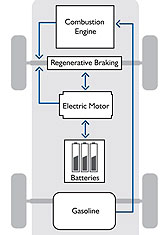A hybrid electric vehicle uses both an electric motor and an internal combustion engine to propel the vehicle. A hybrid is designed to capture energy that is normally lost through braking and coasting to recharge the batteries (regenerative braking), which in turn powers the electric motor--without the need for plugging in.

A 'parallel' hybrid electric vehicle uses the electric motor or the internal combustion engine to propel the vehicle. A 'series' hybrid electric vehicle uses the electric motor to provide added power to the internal combustion engine when it needs it most, for example, in stop-and-go driving and acceleration. Hybrid electric vehicles have the potential to use electricity to power onboard accessories or to provide outlets to plug in appliances or tools. All have the potential to achieve greater fuel economy than conventional gasoline-engine vehicles.
The hybrid market is growing--there are a variety of hybrid electric vehicles available to consumers today, with more models on the way. Cities across the country are already benefiting from the use of hybrid electric buses in their communities.
Advantages of hybrids:
- Reduced fuel consumption and tailpipe emissions
- Optimized fuel efficiency and performance
- Lower fueling costs
- Recovered energy from regenerative braking
- Uses existing gas station infrastructure
Challenges of hybrids:
- Complexity of two powertrains
- Component availability--batteries, powertrains, power electronics
- Higher initial cost
How much fuel do hybrids save?
Hybrids have received attention for their EPA-estimated miles-per gallon ratings because hybrids use fuel economy as a main selling feature. Recent media coverage has shed light on the fact that some hybrid owners don't get the advertised fuel economy from their vehicles. Most hybrid owners are pleased with their vehicle's fuel economy, recognizing the superior performance of hybrids when compared to conventional vehicles.
The EPA laboratory test that is used to establish fuel economy for passenger vehicles, which was developed in the 1970's. EPA estimates for passenger vehicles tend to be higher than actual fuel economy achieved once factors such as terrain, load, tire pressure, temperature and individual driving habits are taken into account. EPA estimates for any vehicle are usually higher than what a driver will experience. Not achieving the EPA estimate for a particular car is not an issue that is exclusive to hybrids.




